As if there weren't enough modifiers in the heading, "Top 15 Movie Musicals Of the Last 50 Years," I still have to preface this list with a few disclaimers. I've obviously made it a little easier on myself limiting the time period, but this is still extremely subjective. By cutting off decades of classic Hollywood musicals, including everything with Fred Astaire and Ginger Rogers, not to mention "West Side Story," I've basically avoided having to defend my apathy toward dance, but you should still know this list reflects movies that offered me something akin to what I look for in a musical onstage, which is mostly about that kind of storytelling narrative singing that offers a heightened experience of character and comedy and drama.
| |
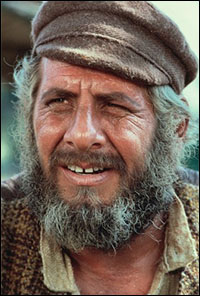 |
|
| Topol in "Fiddler on the Roof." |
If it's a heightened experience through song, of character, comedy and drama we're looking for, then we can do no better than "Fiddler on the Roof." Just as in the phenomenally successful stage version, Jerry Bock, Sheldon Harnick and Joseph Stein's adaption of Sholem Aleichem's Tevye stories is perhaps the perfect American musical in the modern Rodgers and Hammerstein "integrated book/score" mold where the songs advance the plot and illuminate character. This tale of family and community in times of social change and societal upheaval touched a chord literally everywhere on Earth and its instantly hummable, stirring score of rich melodies and perfect lyrics entered global consciousness, never to depart. The film version is extremely faithful to the original piece, with only the most minor changes necessary to make the piece work in the new medium, sacrificing some of the presentational staginess that worked so well on Broadway and elsewhere with an impressive cinematic naturalism and epic scope, thanks in part to shooting on beautiful and entirely realistic location.
| |
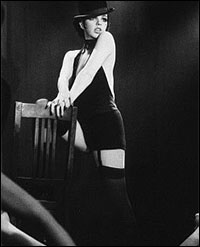 |
|
| Liza Minnelli |
Not at all a faithful adaption of the stage version, Bob Fosse threw out all Cabaret's "book songs," keeping only the performance numbers set in the Kit Kat Klub, which would almost disqualify "Cabaret" from my list, were it not for the fact that these songs are used to comment on what is going on in the plot, and in fact resonate so strongly with the characters — principally Sally Bowles, as played by Liza Minnelli — that they come across basically as book songs. It's a brilliant coup that kills two birds with one stone, successfully navigating the main obstacle facing most movie musicals, which is how to justify the characters singing. And what songs they are. Kander and Ebb hit their stride brilliantly with this score and Fosse and Minnelli's collaboration is just about as thrilling as you could hope for. Not for nothing, "Cabaret" also happens to be an enthralling, incisive, emotional film on a subject so important as Nazism and the slippery slopes from the personal to the political and back again. "Cabaret" earns a place on many lists of best films, musical or not. But lucky, for us, musical it is.
| |
 |
|
| Julie Andrews |
And speaking of Nazism, "The Sound of Music," while lighter fare than "Cabaret" to be sure, touches on the Nazis too, albeit mostly in a successful 11th-hour escape. But what is most remembered of "The Sound of Music" is Julie Andrews' timeless performance, the iconic Rodgers and Hammerstein score and those glorious mountains, against which so much of the story is played. Certainly, when many people think of musicals, they think of that opening sequence. "The Sound of Music" is such an ingrained part of our culture that it can bring up negative associations with saccharine cliché, but the movie is truly engrossing and Julie Andrews is at her formidable best. It's an extremely effective realization of a classic musical and it will remain the standard bearer for generations. I hasten to add the similarly sumptuous "The King and I" might have made this list too were it not released prior to my convenient 50-year cut-off. The same goes for the very different in aesthetic, but perhaps even more essential as Hollywood representation of the Golden Age of Broadway Musicals, "Oklahoma!" and "Carousel."
| |
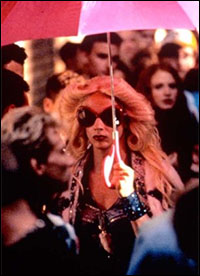 |
|
| John Cameron Mitchell |
I was a huge fan of the original Off-Broadway production of Hedwig and the Angry Inch, written by and starring John Cameron Mitchell, and I returned to the Jane Street Theatre 10 times to see all the Hedwigs. It was striking how well, and how differently, the show worked with each of them. There were even fascinating differences between John Cameron Mitchell’s initial run in the show (when Hedwig's obscurity seemed essential to the story) and his later return before one of the announced closing dates (when he was given a rock star's reception by an adoring fan audience who knew every word of the score and script). “Hedwig” was always great.
Directing and starring the film himself, Mitchell employed to great advantage that very malleability of the script (a performance by Hedwig) by anchoring each scene at a different stop along Hedwig's tour, allowing for a great variety of audience dynamics to contextualize Hedwig's performance as well the backstage story. The backstage story, or plot of Hedwig, was also given a much more explicit treatment to expand a story, which inititally could have been almost ignored as connective tissue and between-song "patter" into a full cinematic arc. All of this ensured that the hilarious and moving story of Hedwig (and Stephen Trask's stunningly wonderful songs, in some ways the first true rock musical score as opposed to musical theatre pastiches of rock) would be preserved in perfection for eternity.
| |
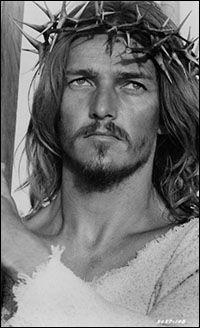 |
|
| Ted Neeley |
I love the movie "Jesus Christ Superstar." It straight-up lifts the sung-through rock opera score of the stage show, daringly utilizing it as the screenplay. People can balk at the potentially corny 1970s style "hippies putting on a show" concept behind some of the production elements and the opening and closing sequences, but I think these choices are in keeping with the anachronistic tone of the lyrics and offer a valid and engaging context for this raw and exciting work from Andrew Lloyd Webber and Tim Rice. The performers, many of them pulled from the Broadway production, are excellent singers and act their roles with conviction. This remains a movie I can enjoy again and again.
| |
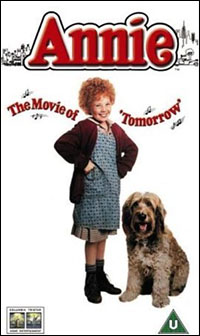 |
|
| Cover art |
Another controversial addition to this list (and another film I grew up watching again and again) is the big screen adaption of the Broadway megahit Annie. I suppose an old-fashioned musical like "Annie" wasn't what was trendy in the early 80s and fans of the stage show were no doubt disappointed with a movie that skimped on much of the satire and irony in favor of a more straight-shot approach. Nonetheless, "Annie" had me hook, line and sinker. If Aileen Quinn in the title role lacked Andrea McArdle's beguiling brawn and brilliant belt, she was a kind of an everyman that offered an entire generation a way into the Depression-Era story. And the rest of the cast was absolutely stellar: Carol Burnett was hysterically funny, absolutely fabulous and in top voice as Miss Hannigan, Albert Finney was definitive as Warbucks, Ann Reinking was elegant and beautiful as Grace and Tim Curry and Bernadette Peters were deliciously salacious and irrepressible as Rooster and Lily. I could watch "Annie" right now.
| |
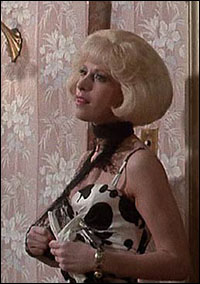 |
|
| Ellen Greene |
Little Shop of Horrors is such a perfect musical as to be an anomaly in its time. In the 80s, the successful shows were big, impersonal pop operas, not quirky little musical comedies. Nonetheless, Little Shop ran for years Off-Broadway and, despite the film's rocky reception and unimpressive box office performance, "Little Shop of Horrors," like "Annie," triumphed in the home video market, fully establishing itself an essential part of contemporary pop culture, thanks in part also to its extreme suitability for amateur productions where it has become a staple everywhere. The vast majority of women (and girls) cast in the role of Audrey play the part in the same style as Ellen Greene's unforgettable original, and this wide reach of her iconic portrayal must be credited to the movie (in which she recreated her role) as well.
| |
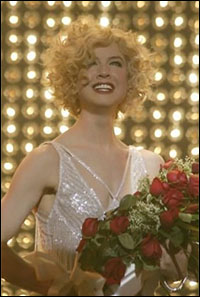 |
|
| Renée Zellweger |
Inasmuch as Rob Marshall's flashy film of "Chicago" is a departure from Bob Fosse's gritty original production, its success is also a tribute to Fosse. While Fosse's original production of Chicago was somewhat overshadowed by the cultural watershed A Chorus Line, which opened the same year, Walter Bobbie's smash hit (still running!) 1996 Broadway revival stripped the piece down to its essentials, perhaps offering audiences easier access to the by-then very relatable theme of the celebrity of crime. Ironically that spare, lean version paved the way for Marshall's almost epic screen realization, which, while departing from Fosse's style aesthetically, liberally borrowed from Fosse's cinematic concepts in translating music and dance to the big screen. As Fosse himself wrote the libretto, the movie "Chicago" ends up feeling like an ecstatic celebration of Fosse himself, in all his hard-bitten show biz glory.
| |
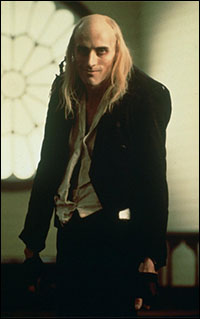 |
|
| Richard O'Brien |
From the lewdly disembodied lips offering exposition on "the late-night, double feature picture show" to the surprisingly emotional 11 o'clock ballad "I'm Going Home," "The Rocky Horror Picture Show" dazzles by functioning on a multiple layers at once from quaint to commentary to camp to cutting edge to compelling. "The Rocky Horror Picture Show" is so easy to digest, you can miss just how substantial a piece of work it is, but its major international success is well deserved and the ubiquity of "The Time Warp" is ample evidence of its status.
| |
 |
|
| Beyoncé |
Dreamgirls may be the best musical of the 1980s and Bill Condon's wonderful 2006 film adaptation's biggest crime is not being as good a movie as Dreamgirls was a show — a failing that was probably unavoidable given Michael Bennett's auteur-like role as writer/producer/director/choreographer of the original — Dreamgirls was conceived expressly for the stage. It's a pleasant surprise that the "Dreamgirls" movie works as well as it does, particularly exciting as a vehicle for co-leading ladies Jennifer Hudson and Beyonce to strut their stuff amidst decadent production values. The only instances where the film begins to disappoint are in some of the more operatic moments, like the climactic musical group argument sequence, "It's All Over," where the all-of-a-sudden recitative song style is poorly established and fails to sizzle like it does on stage. Unfortunately, this is the moment that launches into the crown jewel of "Dreamgirls," "And I Am Telling You I Am Not Going." Alas, "Dreamgirls" is still great.
| |
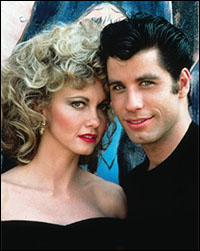 |
|
| Olivia Newton-John and John Travolta |
"Grease" is not a brilliant musical, but it's been exceedingly popular since its long-running original Broadway production in 1972. It's a fun piece of 1950s nostalgia. The movie, not a faithful adaptation with its liberally incorporated pop songs, and disco-era auxiliary compositions by the BeeGees and others, manages to create a hybrid world of its own where these 30-something stars make sense as high school kids. The staggering success of the movie has contributed to even more stock and amateur productions all over the world and yet even in high-profile Broadway and West End revivals, nothing can ever approach the impact the film makes with the material.
| |
 |
|
| Audrey Hepburn |
"My Fair Lady" is another perfect old-school musical and the first-rate film version featuring the legendary Rex Harrison alongside the sublime Audrey Hepburn is only relegated near the end of this list as a penalty for Hepburn not singing her own songs. The most important thing in a musical is the songs — otherwise why bother having them? You can't just farm out the work. That said, Hepburn is enchanting and Marni Nixon, the queen of the dubbers, pretty much nails singing convincingly as Hepburn. That doesn't make it okay, though!
| |
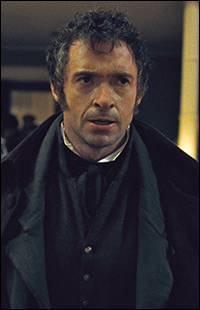 |
|
| Hugh Jackman |
A mega-musical among mega-musicals, Les Misérables has enjoyed mind-blowing success all around the world over the nearly three decades since it first opened. I was thrilled with the excellent movie that was finally made all these years later, and for the most part, found director Tom Hooper's choice to record the vocals live on set effective at capturing some the spark of spontaneity more common to performances onstage. Unfortunately, this also put constraints on the singers, many of whom were not entirely equal to the task, but the whole is greater than the sum of its parts. As someone who hadn't listened to Les Misérables in years, seeing the movie was a satisfying revival of my original love for this piece which has brought so many people into the theatre, literally and figuratively.
| |
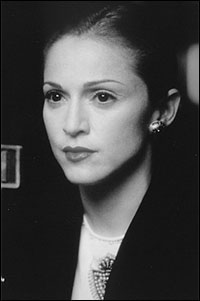 |
|
| Madonna |
And speaking of singers not equal to the task, the casting of Madonna as Eva Peron guaranteed that the movie "Evita" would have none of the visceral fire that ignited the stage when Patti LuPone created the role on Broadway. Sadder still, the decision was made to soften the characterization of Eva, eliminating some of her more vengeful moments (i.e. the best moments in the show), presumably in order to appease the then Peronist government of Argentina so that key scenes could be filmed on historic location (e.g. the actual "Balcony of the Casa Rosada"), rather than on a soundstage. Still, Madonna acquitted herself as well as possible given those constraints, and when you think about the fact that they had to rewrite the lyric "she's the New World Madonna" (to "she's Our Lady of the New World"), it's hard to imagine anyone as suited to the scope of Eva's influence. Throughout the film when you see Madonna's own iconic face on the posters and banners carried by the "Descamisados," there's a Warholian synergy neither Meryl Streep nor Michelle Pfeiffer nor any of the other actresses rumored for the role could have delivered. Moreover, Alan Parker was forging new ground filming this sung-through style of pop opera for the MTV generation and he did it brilliantly, effortlessly weaving scenes together both tied to the narrative focus of the lyrics and as supplemental footage. "Evita" is, gorgeous, powerful and extremely watchable, and it boded well for the subsequently increased interest in movie musicals after a long, dormant period.
| |
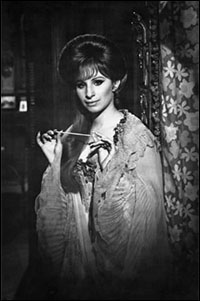 |
|
| Barbra Streisand |
Some would call it sacrilege to include "Hello, Dolly!" on this list. The movie was not a great success. Also, many people feel Barbra Streisand was too young for the role, too Jewish, too weirdly Mae West-like, too much, not enough, too something. And poor Carol Channing was still in her prime and should have gotten to preserve her definitive Dolly, an important slice of Broadway history. Even the most ardent Streisand fans would take issue with me including "Hello, Dolly!" over Stresaind's own Oscar-winning triumph recreating her Broadway turn in "Funny Girl." But I choose "Hello, Dolly!" Don't get me wrong: I could watch the first hour of "Funny Girl" on a daily basis and never tire of Barbra's ugly duckling struggling to become a star, belting out those unbeatable standards "I'm The Greatest Star," Don't Rain On My Parade" and "People." But around half-time, "Funny Girl" loses me. Say what you will about "Hello, Dolly!" It's based on a tightly constructed Thornton Wilder play and the story holds up — in any adaption. And I love Barbra as Dolly. I think she's funny and sexy and totally believable and charming and she sings the hell out of the songs. Sorry, Carol. Sorry, everyone.
(Ben Rimalower is the author and original star of the critically acclaimed Patti Issues. Read Playbill.com's coverage of the solo show here. Visit him at benrimalower.com and follow @benrimalower on Twitter.)










